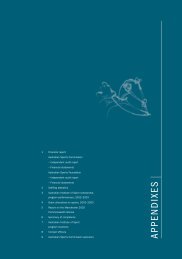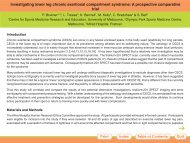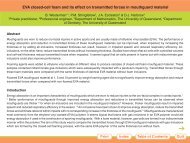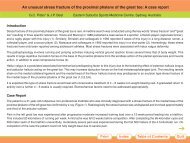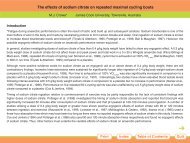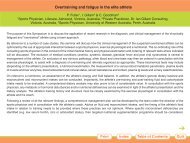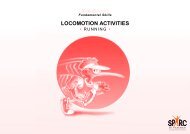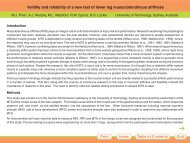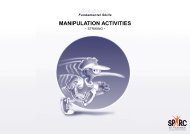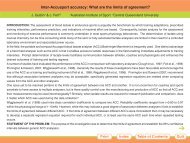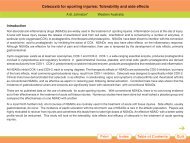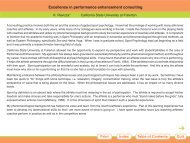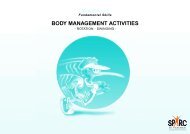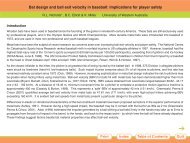2002-03 Annual R eport 2002-03 Annual R eport - Australian Sports ...
2002-03 Annual R eport 2002-03 Annual R eport - Australian Sports ...
2002-03 Annual R eport 2002-03 Annual R eport - Australian Sports ...
Create successful ePaper yourself
Turn your PDF publications into a flip-book with our unique Google optimized e-Paper software.
No blues for New South Wales. Steve Waugh relished the chance to lead his state to its 43rd domestic first-class title. New South Wales became the first side to win the<br />
domestic double in a season since 1993-94, when the Blues also achieved the feat.<br />
PURA CUP, <strong>2002</strong>-<strong>03</strong><br />
New South Wales won its first domestic first-class title since<br />
1993-94 when it secured the Pura Cup by comprehensively<br />
outplaying an under-strength Queensland at The Gabba in<br />
March 20<strong>03</strong>.<br />
The success, which completed a domestic double with the ING<br />
Cup secured a month earlier, was yet another triumph to savour<br />
for captain Stephen Waugh, and he played a significant part in<br />
its achievement. Following the Ashes triumph against England,<br />
he returned to state duty in late January. New South Wales won<br />
three of its last four matches, a run of form that saw it pip<br />
Victoria for a place in the final.<br />
Waugh’s own form with the bat was equally impressive. He<br />
scored 659 runs in seven Pura Cup matches, including a careerbest<br />
211 against Victoria. Those runs helped persuade him to<br />
play on at Test level as he made himself available to lead the<br />
side in the West Indies.<br />
But New South Wales’ success was hardly a one-man show.<br />
Michael Clarke and Michael Slater both topped 700 runs, while<br />
in Stuart MacGill the Blues had the leading wicket-taker in the<br />
competition as he claimed 48 wickets from 10 matches.<br />
Equally important was the contribution of newcomer Simon<br />
Katich, in his first season in Sydney after switching from<br />
Western Australia. Katich scored 619 runs and also took 19<br />
wickets at minimal cost with his left-arm wrist spin.<br />
Brett Lee was briefly influential, regaining his Test spot after<br />
claiming 21 wickets in two matches. Stuart Clark (30) and Don<br />
Nash (26) were also among the wickets and with Michael Bevan,<br />
Mark Waugh and wicket-keeper Brad Haddin all topping 400<br />
runs, New South Wales bore the formidable look of years gone by.<br />
Queensland reached the final on the back of its impressive pace<br />
attack as Michael Kasprowicz, Joe Dawes and Ashley Noffke<br />
shared 127 wickets between them. In the end, however, the<br />
91<br />
absence of key players Matthew Hayden, Jimmy Maher and<br />
Andrew Symonds on World Cup duty, plus an injury to Stuart<br />
Law, stretched its batting resources too thin in the final and<br />
New South Wales capitalised. Nevertheless Clinton Perren<br />
(693 runs) and Lee Carseldine (658 runs) could be proud of<br />
their seasons.<br />
Victoria coach David Hookes identified the Bushranger’s failure<br />
to win more than once away from home as the key factor behind<br />
the side’s inability to finish in the top two places. However,<br />
despite that disappointment, the side made significant progress<br />
after finishing next to bottom of the ladder the previous year.<br />
Jason Arnberger returned to near his best form and Matthew<br />
Elliott and Brad Hodge also passed 500 runs. Mick Lewis<br />
finished as the side’s leading wicket-taker, leg-spinner<br />
Cameron White made encouraging progress, and Victoria<br />
unearthed a tearaway fast-bowler called Shane Harwood who<br />
took 28 wickets in seven matches, including a hat-trick against<br />
Tasmania.<br />
South Australia, in Greg Chappell’s last season as state coach,<br />
could boast the two leading run-scorers in the competition in<br />
Greg Blewett and David Fitzgerald, as well as 651 runs from<br />
Mark Higgs, newly arrived from New South Wales. But without a<br />
cutting edge in its attack it took 20 wickets in a match just three<br />
times. There were individual successes for Western Australia,<br />
with Chris Rogers and Michael Clark impressing, but it<br />
struggled in the face of international calls and also lacked<br />
bowling depth. Tasmania finished bottom of the ladder for the<br />
second year in a row, although it was encouraging to see fastbowler<br />
Damien Wright, previously dogged by injury, play in nine<br />
of its matches, claiming 32 wickets.<br />
P ura Cup, <strong>2002</strong>-<strong>03</strong>



